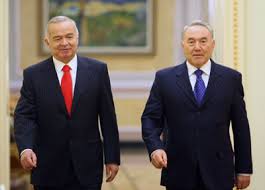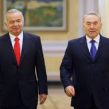
Looming Generational Change in Central Asian Leadership
Publication: Eurasia Daily Monitor Volume: 11 Issue: 89
By:

Not for the first time, a website has reported the death or incapacitation of a Central Asian leader only to have the report swiftly taken down and denied (see the blanked out “story” at
dallol.ru/news-i1221.html). Up to now, these reports have not been accurate at least since the death of Turkmenistan’s Saparmurat Niyazov (“Turkmenbashi”) in 2006. Their increasing frequency surely reflects the fears or hopes of some in the region. But just as importantly, such stories highlight the aging of the two most important leaders in Central Asia and the certainty that, at some point, they will pass from the scene.
Uzbekistan’s Islam Karimov is 76 and has been president since March 1990; and Kazakhstan’s Nursultan Nazarbayev, who will be 74 on July 6, has been president since April 1990. Prior to that date, both men headed the communist party organizations of their respective Soviet republics. The leaders of the three other Central Asian countries are younger and have been in office for a far shorter time, either because of the death of the man who remained in power after the collapse of Soviet power (Turkmenistan) or because of political instability and even revolutions (Tajikistan and Kyrgyzstan).
Both Karimov and Nazarbayev have justified their authoritarian rule as a requirement of state building in what is a dangerous neighborhood. Indeed, today marks the ninth anniversary of Karimov’s suppression of the Andijan uprising (https://www.fergananews.com/articles/8135). But precisely because they have governed in the way that they have, a change in leadership—when it comes—is likely to represent a radical break with the past, allowing a new and quite different generation to come to power. And the new leaders’ values may be entirely different than those of the incumbent presidents.
Many in the West have actively supported these two presidents because of the stability they have been able to provide, and equally many have expressed the hope that their successors will continue current policies much as Niyazov’s successor Gurbanguly Berdimuhamedov has done in Turkmenistan. But there are two reasons why that seems unlikely or even, ultimately, impossible.
On the one hand, Turkmenistan is a special case. It remains a tribal society, and the leaders of that country have come out of the same tribal confederation that played a predominant role before the Russians arrived in the nineteenth century, after they got there, under the Soviets, and since the Soviet Union disintegrated. Over time, that social structure is likely to evolve and even collapse, but there is little evidence that this will be the case anytime soon.
And on the other, both Nazarbayev and Karimov received their start in the Communist Party and remain profoundly affected by that. Indeed, there is a widespread joke in Tashkent that Uzbekistan did not leave the Soviet Union; the Soviet Union left Uzbekistan, which remained what it was. In Kazakhstan, there are important sub-national divisions: the three “hordes” into which Kazakhs have traditionally divided themselves, as well as a significant ethnic Russian population. Nazarbayev has played on these divisions, but because no one group is predominant and because he is promoting a Kazakhstani identity, they are likely going to be less important in the future.
In Uzbekistan, long a sedentary population unlike formerly nomadic Kazakhstan, tribal or clan divisions are far less significant. In contrast, regional differences matter profoundly, but even they are less important than in Soviet times given the radical centralization of the Karimov government.
There are three other reasons for concern about the coming generational change in the leaderships of these two countries and perhaps the others as well. First, Nazarbayev and Karimov have tolerated little or none of the kind of political competition that democracies require and thus have not allowed the emergence of any new leaders with the skills open politics require. As a result, new leaders are either going to come out of the court or emerge from what are, in fact, underground political groupings. Indeed, people from the latter are more likely over time due to growing popular resentment and the increasing difficulty of these regimes to meet the needs of their burgeoning populations.
Second, both out of a calculation about how to keep themselves in power and with an eye to gaining Western support, Nazarbayev and Karimov have typically described all opposition figures as Islamist. While some of them are, many are not. But suggesting that they all are has had the unintended effect of making the Islamist elements seem stronger than is actually the case and has even added to their power. That, in turn, means that Islamist groups, rather than those committed to an open civil society, may have the inside track during a succession crisis.
And third, there is a new challenge. Having failed to back the right horse in Ukraine, Moscow is currently seeking to identify future leaders it can support in the non-Russian republics. Such Russian support will not be trivial, although if it is too open, it may backfire. But that too will complicate the succession crises, which the actuarial tables make inevitable.




